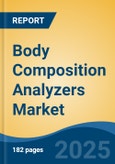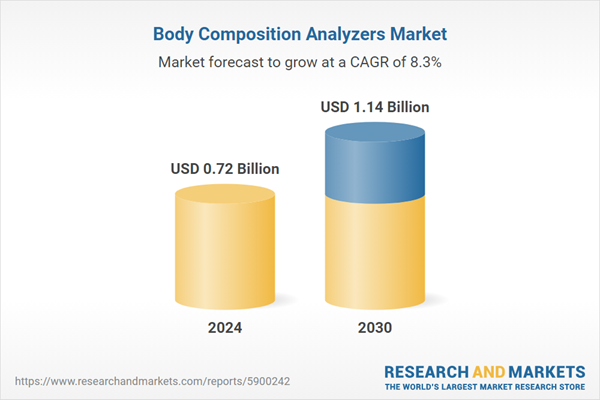Speak directly to the analyst to clarify any post sales queries you may have.
10% Free customizationThis report comes with 10% free customization, enabling you to add data that meets your specific business needs.
This market encompasses a range of devices and solutions designed to measure and analyze an individual's body composition, including metrics like body fat percentage, muscle mass, bone density, and water content. These analyzers have become integral tools for individuals, healthcare professionals, and fitness enthusiasts alike, shaping the landscape of healthcare and fitness technology. For instance, the World Obesity Atlas projects that by 2030, around one billion people worldwide - one in five women and one in seven men - will be living with obesity. This rising trend underscores the increasing demand for body composition analysis solutions.
The global body composition analyzers market has witnessed significant expansion, and its size continues to grow. This growth is attributed to the escalating demand for precise and personalized health information, especially in the context of a worldwide increase in health-consciousness and fitness awareness. According to market research reports, the market is projected to maintain a steady growth trajectory in the coming years, with a compound annual growth rate (CAGR) that reflects its strong potential. A key example is the January 2024 partnership between Orangetheory Fitness and InBody, bringing professional body composition analysis to over 1,400 studios. This collaboration is transforming fitness tracking, making advanced body composition insights more accessible to the public and enhancing how individuals monitor their health and progress.
Key Market Drivers
The Pursuit of a Healthier Lifestyle
In recent years, there has been a remarkable shift in societal attitudes toward health and well-being. People are increasingly conscious of the importance of leading healthier lives, which includes maintaining an optimal body composition. This shift is driven by several factors:As information about the link between lifestyle and health becomes more accessible, individuals are motivated to take proactive steps to improve their overall well-being. Body composition analyzers offer a tangible way to measure progress and set realistic health goals. Many people are actively engaged in fitness and weight management programs. These individuals often use body composition analyzers to track their progress, as they provide more accurate and comprehensive data than traditional scales. The desire for personalized health and fitness plans has grown significantly. Body composition analyzers enable individuals to tailor their diets and exercise routines based on specific measurements, ensuring that they are working towards their unique goals.
Key Market Challenges
High Initial Costs
One of the primary challenges facing the adoption of body composition analyzers is the high initial cost associated with these devices. Advanced analyzers, equipped with cutting-edge technology and precision measurement capabilities, can be quite expensive. This poses several obstacles:The high cost of these devices makes them inaccessible to a significant portion of the population, particularly in developing countries and underserved communities. This limits the market's potential customer base and hinders market growth. Healthcare institutions, especially in regions with limited budgets, may find it challenging to allocate resources for expensive analyzers. This can result in delayed adoption or reliance on less accurate and older equipment.
Key Market Trends
Integration of Artificial Intelligence (AI) and Machine Learning (ML)
One of the most significant trends in the body composition analyzers market is the integration of AI and ML technologies. These advanced analytical tools are being incorporated into body composition analyzers to enhance their capabilities in several ways:AI and ML algorithms can analyze body composition data more effectively, leading to increased measurement accuracy. This is especially valuable for healthcare professionals and fitness enthusiasts who rely on precise data for decision-making. AI-powered analyzers can provide personalized recommendations based on an individual's body composition and health goals. This trend aligns with the growing demand for tailored fitness and nutrition plans. Some analyzers equipped with AI can offer real-time monitoring and feedback, allowing users to make immediate adjustments to their fitness or dietary routines.
Key Market Players
- Bodystat Ltd
- Cosmed S.R.L
- Hologic Inc.
- Inbody Co. Ltd
- Maltron International Ltd
- Omron Healthcare Inc.
- Seca GmbH & Co. Kg
- Tanita Corporation
- Fitbit Inc.
- Koninklijke Philips NV
- EatSmart Inc.
Report Scope:
In this report, the Global Body Composition Analyzers Market has been segmented into the following categories, in addition to the industry trends which have also been detailed below:Body Composition Analyzers Market, By Product:
- Bio-impedance Analyzer
- Skinfold Calipers
- Hydrostatic Weighing Equipment
- Air Displacement Plethysmography
- Dual Energy X-ray Absorptiometry
- Other
Body Composition Analyzers Market, By End-User:
- Hospitals
- Fitness Clubs and Wellness Centers
- Academic and Research Centers
- Other
Body Composition Analyzers Market, By Region:
- North America
- United States
- Canada
- Mexico
- Europe
- France
- United Kingdom
- Italy
- Germany
- Spain
- Asia-Pacific
- China
- India
- Japan
- Australia
- South Korea
- South America
- Brazil
- Argentina
- Colombia
- Middle East & Africa
- South Africa
- Saudi Arabia
- UAE
Competitive Landscape
Company Profiles: Detailed analysis of the major companies present in the Global Body Composition Analyzers Market.Available Customizations:
With the given market data, the publisher offers customizations according to a company's specific needs. The following customization options are available for the report.Company Information
- Detailed analysis and profiling of additional market players (up to five).
This product will be delivered within 1-3 business days.
Table of Contents
Companies Mentioned
- Bodystat Ltd
- Cosmed S.R.L
- Hologic Inc.
- Inbody Co. Ltd
- Maltron International Ltd
- Omron Healthcare Inc.
- Seca GmbH & Co. Kg
- Tanita Corporation
- Fitbit Inc.
- Koninklijke Philips NV
- EatSmart Inc.
Table Information
| Report Attribute | Details |
|---|---|
| No. of Pages | 182 |
| Published | March 2025 |
| Forecast Period | 2024 - 2030 |
| Estimated Market Value ( USD | $ 0.72 Billion |
| Forecasted Market Value ( USD | $ 1.14 Billion |
| Compound Annual Growth Rate | 8.2% |
| Regions Covered | Global |
| No. of Companies Mentioned | 11 |









